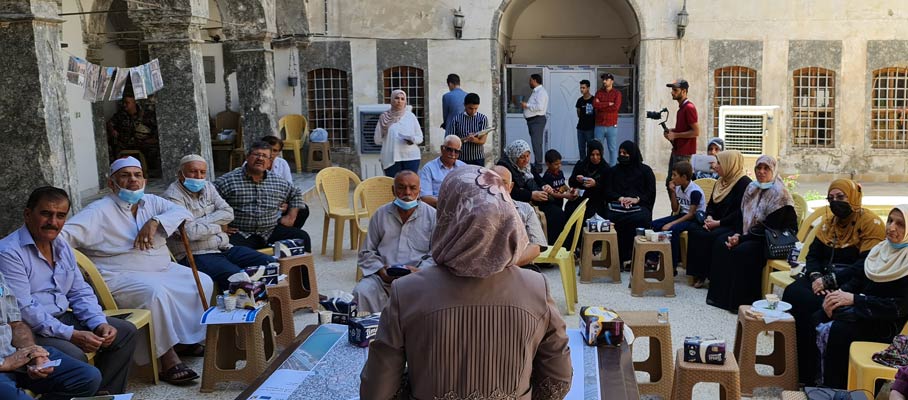The world needs to get to grips with urban crises response
The War in Ukraine Is Also an Urban Crisis
The war in Ukraine has had a devastating impact on its people. An estimated 4,000 civilians have been killed and 14 million have fled their homes, either to other places in Ukraine or to neighbouring countries.
Aside from causing immense human loss and suffering, the conflict has created an urban crisis, with large parts of towns, cities, and infrastructure destroyed and different cities coping with the arrival of thousands of displaced.
It is a crisis that will challenge and strain urban areas for years ahead, even if the conflict were to end soon. An international conversation, therefore, needs to start urgently on how to sustain the integration of the displaced, given the additional burden on cities’ resources and infrastructure, and how we can start building back neighbourhoods and cities wherever and whenever possible.

How Do We Build Back Better?
This is not just about building back better buildings but also more sustainable neighbourhoods and communities. Local governments and local communities need to be empowered to lead these bottom-up recovery efforts. A territorial approach is needed also to recognise the economic role of cities. This conversation should be set in the context of urban crisis recovery and sustainable urbanization across the world, not just in Ukraine.
How Is the War in Ukraine Included in the WUF11 Agenda?
There could probably be no more appropriate location for debating these issues than Katowice, one of the many Polish cities hosting their share of the country’s three million Ukrainian refugees, and no more appropriate occasion than the eleventh session of the World Urban Forum (WUF11), the premier global conference on sustainable urbanisation.
The agenda for the 26-30 June conference, convened by UN-Habitat and co-organised with Poland’s Ministry of Development Funds and Regional Policy and the Municipal Office of Katowice, has accordingly been altered to include discussions on the future of urban crises, how cities can be made more resilient in the face of such shocks, and how to shape urban recovery in complement to nationally led reconstruction efforts, including in Ukraine.
This added focus has resulted in two new high-level events with contributions from senior international and Ukrainian representatives, including the United Nations, the World Bank, European Commission, national and local governments, and prominent city mayors, and in a special session convened by the Polish government.
Discussions will include urban recovery in other contexts, such as Yemen, Syria, Iraq, and Afghanistan, and the multiple crises that were already confronting cities around the world before Ukraine, namely the climate emergency, COVID-19, rapid urbanisation, and growing inequality. Here is an outline of those new events:
Dialogue on Urban Crisis Response and Recovery:
- Reflect on what the nature and scale of urban crises will be in the future and how they will change our cities.
- Reflect on the increasing scale of displacement of people and communities and how that will transform our urban landscape.
- Explore how recovery from crises is an opportunity to accelerate the needed transformation towards a more resilient, green, healthy, and just urban future, leaving no one and no place behind.
- Advocate for a tailored response to urban crises and discuss the role of mayors as both first responders and visionaries who can mobilise a whole-of-society response, empowered by national governments and the international community.
Special Session on Urban Recovery Frameworks:
- Discuss the key components of urban recovery framework, considered a key missing piece to ensure that institutional arrangements, policies and financing instruments are in place to ensure sustainable, inclusive, and resilient urban recovery from crises.
- Discuss the lessons learnt from urban recovery frameworks developed in the Middle East and North Africa region in recent times.
- Explore how urban recovery can be supported in Ukraine.
Special Session on Rebuilding Communities After War and Natural Disasters, organised by the Government of Poland:
- Discuss the planning of post-crisis reconstruction of urban spaces and population return.
- Look at how to engage social organisations in the reconstruction of cities, with particular attention to the most vulnerable groups.
- Include voices from cities that have experienced conflict and natural disasters.
- Discuss “building back better”, and possible broader definitions of the term.
In addition, the Business Assembly will also have a dedicated segment on the role of the private sector in supporting the urban recovery in Ukraine. At appropriate moments, UN-Habitat hopes to share some of its expertise from its substantial experience in recovery efforts in Afghanistan, Iraq, Somalia, Syria, Yemen, Lebanon, and other places.
These will be part of an urban crisis track at the World Urban Forum with over 45 events mobilising representatives from international agencies, government, civil society, academia, and the private sector working together to mitigate human suffering and create a sustainable future for the world’s urban areas.
Please join us. Online registration for WUF11 – Transforming Our Cities for a Better Urban Future is free and remains open until June 22.
